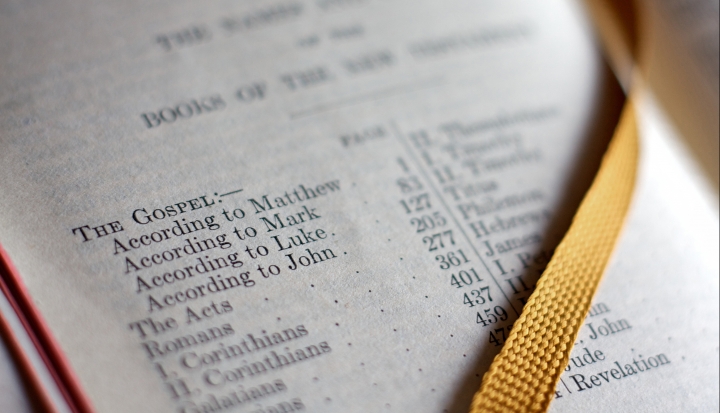My brother was born prematurely during a blizzard. Mom made it to the hospital in time to deliver, but Dad was stuck in a snow bank, the tires of our Chevy spinning as he shoveled cinders furiously. My sisters and I were bundled in snowsuits in the backseat, going nowhere as the cold crept into the car.
That night looms in my memory like it happened last week. Yet depending on who tells the story-Mom, Dad, my sisters, or me-the details change, sometimes dramatically. Our personal experience of these events-what was most important to us-and the passage of time both affect how we tell the story. As does who we are telling it to and why.
The four gospel writers tell the story of Jesus differently for similar reasons. They were probably not eyewitnesses to the events they describe. They wrote a generation beyond the time of Jesus. Writing for different communities, they underscored themes significant for their audience. What prompted each to commit his story to the record?
Literacy was rare. People relied on oral tradition to carry wisdom forward. No one wrote down the words of Jesus as he spoke them. But later, as the gospel eyewitnesses were martyred, it became clear that someone ought to write down the story for future believers. Mark made the first attempt, between 64 and 70 A.D. Mark may have been Peter’s interpreter and “son in faith,” mentioned in 1 Peter.
Or he may have been a Greek convert of Paul’s named John Mark in Acts. If Mark were influenced by Peter’s eyewitness account or Paul’s latecomer conversion, the difference in his source would affect his story.
Luke probably wrote next, between 80 and 85 A.D. Catholic scholars rarely dispute that Luke, another Greek companion of Paul’s, authored both this gospel and the Acts of the Apostles. Luke writes his gospel with his second book always in mind. He tells the story of Jesus as a sourcebook for his larger story of the early church.
Only Matthew’s gospel has an author’s name attached to it from the beginning. Because it relies so heavily on Mark’s text, it seems unlikely that Matthew the Apostle was its author. Would an eyewitness need to borrow to tell his story? The composer of Matthew was probably a Jewish Christian who aimed his story at a Jewish audience considering the claims of Christianity.
John’s gospel was written around the end of the first century. The apostle John would have been very old by then, but a community of his followers may have written it. John’s story is written like a reflection pool mirroring the current persecution of the community back into the story of Jesus and his times.
Learning precisely who wrote the gospels may be beyond us. But it may be more important to learn how the church did, and does, tell the story of Jesus vitally in each new generation.
This article appeared in the June 2001 issue of U.S. Catholic (Vol. 66, No. 6, page 22).
Image: Flickr photo cc by khrawlings















Add comment